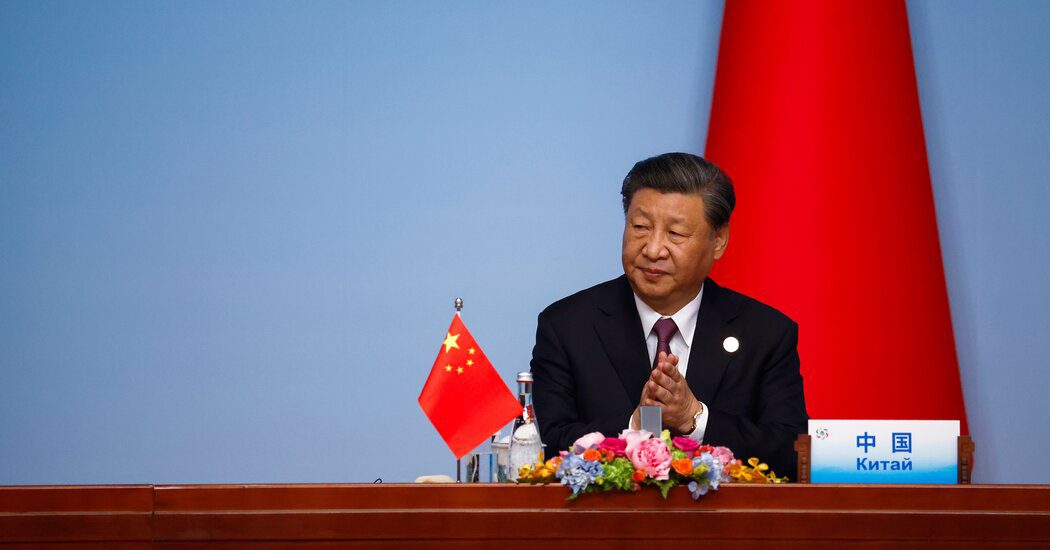Global Courant 2023-05-23 18:06:33
When Russian troops poured into Ukraine more than a year ago, many experts foresaw a strategic windfall for China, with the United States once again distracted by a war far from Asia. Now Beijing is increasingly concerned that the Western bloc that supports Ukraine is entrenched near China.
The leaders of the Group of 7 countries pledged more support to Kiev last weekend and angered Beijing by challenging its claims to the South China Sea, vowing to resist economic coercion and calling China to account for human rights violations in Xinjiang, Tibet and Hong Kong. Days later, Moscow and Beijing cement their relationship by holding security and trade talks, with Russia’s Prime Minister Mikhail Mishustin leading a delegation of business magnates on a visit to China.
The contrast between President Volodymyr Zelensky of Ukraine receiving more arms guarantees from President Biden during the G7 and Mr. Mishustin seeking more economic support for Russia from China’s top leader, Xi Jinping, underscores how deepening geopolitical divisions have been exacerbated by the war.
“China is ready to redouble its relationship with Russia after the G7 summit, because the central theme of that summit included not only the Russian invasion of Ukraine, but also China and how the West should deal with it,” said Alexander Korolev, a senior lecturer. at the University of New South Wales in Australia, who studies Sino-Russian relations.
“The summit and the presence of Zelensky have marked a clearer and deeper geopolitical divide between the West on the one hand and China and Russia on the other,” he added.
Trying to portray a less charged atmosphere, President Biden predicted a thaw in relations with Beijing. But for China, the display of unity among the G7 democracies meeting at their doorstep likely plays a role in Chinese claims that the United States is trying to pool its allies to provoke conflict in the region.
As the Communist Party newspaper Global Times described it Monday, the United States is trying to “recreate the ‘Ukraine crisis'” in the Asia-Pacific region. By doing so, the Chinese argument goes, Washington could wage a proxy war against China as it has with Russia, later justifying what would be a nightmare scenario for Beijing: the formation of an Asia-Pacific version of the North -Atlantic Treaty Organization to contain China’s rise.
The G7 summit was riddled with “uneasy optics” for China, it said Lyle J. Goldstein, a China expert at Defense Priorities, a Washington-based think tank. Chief among these was the event’s hosting by Japan, a power to which China has deep-rooted historical animosity. Chinese state media lashed out at Tokyo this week, accusing the country of doing the “United States’ bidding” and blowing up the “Chinese threat” so it can amend its constitution to allow its military to return to power for the first time since World War II. to build. .
Mr Goldstein said China viewed Japan at the G7 as “colluding with the US” to “engage Europe in the Taiwan issue”, a move he likened to “waving a red flag in front of a bull”.
China is in this predicament because its closest partner, Russia, defied the warnings of the West and invaded Ukraine. Despite the many problems China has caused, Beijing has continued to provide economic and diplomatic support to the Kremlin because of a shared desire to weaken US global dominance.
Mr Mishustin said at a business forum in Shanghai on Tuesday that Russia will continue to maintain relations with China, which remains one of Russia’s sole suppliers of technologies such as microchips and one of its largest energy customers.
“We have expanded trade with the world’s rapidly developing economies. These words fully apply to our great friend, China,” said Mr. Mishustin according to Russian state media, which reported that the two sides were discussing the expansion of cooperation in transport, agriculture and energy.
Mr Korolev, an expert at the University of New South Wales, said the war and Western sanctions have accelerated Russia’s economic reorientation towards Asia. That policy change, which began more than a decade ago, has been met with concerns in Russia about developing an overdependence on China.
“There are no more reservations,” Mr. Korolev said. “All the political barriers that previously existed have now been removed and Russia is no longer concerned about trusting, or even depending on, China for its economic well-being.”
The two countries are also expanding security ties. Chen Wenqing, the head of the Chinese Communist Party’s political and legal affairs committee — which oversees law and order issues — embarked on an eight-day visit to Russia on Sunday and held talks with Russia’s Security Council head Nikolai Patrushev. in Moscow.
At a press conference in Beijing on Tuesday, a foreign ministry spokeswoman, Mao Ning, said Sino-Russian “cooperation has strong resilience and great potential” that would not be “disturbed or threatened by a third party”, a clear reference to the United States. States.
The closer relationship between the two powers has undermined China’s attempt to establish itself as a credible mediator in the war in Ukraine. Last week, China sent a special peace envoy to European capitals such as Kiev, Warsaw, Brussels and Moscow. The envoy, Li Hui, has so far failed to secure a breakthrough as Ukraine has pushed for the complete withdrawal of Russian troops from occupied territory. The Kremlin has rejected those terms, and it’s unclear if China would be willing to pressure Russia to concede given Beijing’s desire to maintain good relations with Moscow.
Mr Li was also dogged by questions about his neutrality due to his alleged affiliation with the Kremlin after serving as a former ambassador to Russia.
“While this experience by itself does not necessarily mean that Li will favor Russia during the negotiations, it certainly does not diminish the impression that China wants to ensure that its relationship with Russia remains intact after the negotiations,” said Cheng Chen, a expert in Chinese politics at the University at Albany-SUNY.
According to Russian state media, Mr. Li Friday to visit Russia.
While the Chinese government has claimed to be neutral about the war, its overarching political narrative on the domestic conflict is fraught with sympathy for Russia and a widespread belief that China will be the next target if Putin is defeated.
Mr Goldstein, the expert on Defense Priorities, said a senior Chinese expert on Russia told him last week during a talk in Beijing that from Beijing’s perspective, “if Russia loses, the pressure on China will only increase and will become much more serious. .”
Many studies by the Chinese government and military analysts portray Ukraine not only as the recipient of crucial Western military and intelligence support, but also as a pawn the United States has lured into its broader strategy to severely weaken Russia and ultimately China.
“If the United States and NATO have the last laugh in their war of confrontation with Russia, then they have finally formed a multilateral military power system of the US, Japan and Europe,” said Liu Jiangyong, a leading expert on China’s relations with Japan. and other Asian countries at Tsinghua University in Beijing, wrote in a recent study. “Even if China becomes the world’s largest economic power, its international security environment may continue to deteriorate.”
Vivian Wang and Olivia Wang contributed reporting.








